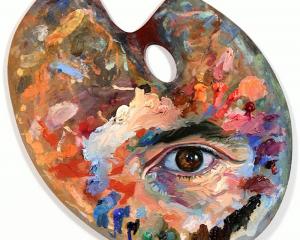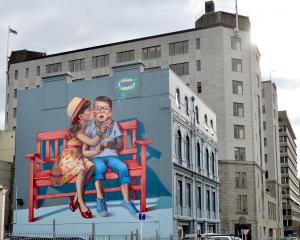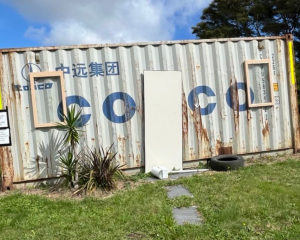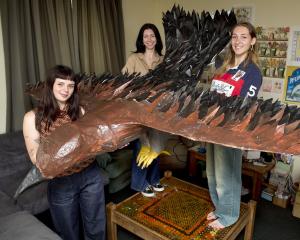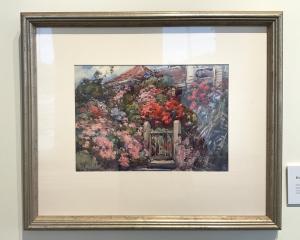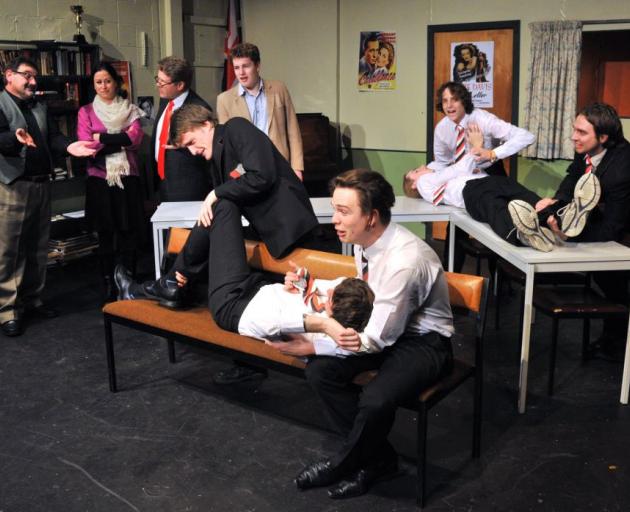
A witty comedy verging on farce with important themes underlying the humour, Alan Bennett's The History Boys opens at the Globe Theatre next week. Charmian Smith reports.
Director Keith Scott seems mildly bemused that the Globe Theatre hasn't staged an Alan Bennett play before.
He's a major modern playwright not just in Britain but around the English-speaking world, he says.
Scot has chosen to stage Bennett's 2004 The History Boys, his most acclaimed play, multi-award-winning both in the UK and US, which has also been made into a film.
It's extremely funny on many levels and also has a young cast. The theatre is trying to encourage young actors, he said.
It is the story of a group of senior schoolboys in a second-rate grammar school preparing for entrance exams and interviews to Oxford and Cambridge.
''From the time the lights go up on the first scene it races through at a great pace, and it's entertaining with a lot of physical action. The boys are absolutely anarchic: they are not just sitting down being good boys, they are doing all sorts of crazy things that boys do, particularly when the teacher's not there. They are interested in study, sport and sex, but not necessarily in that order,'' he said.
However, important themes and issues about education, history and sexual politics are also explored.
The themes of education are age-old: What is education? Is it a means to an end or an end in itself? Each of the teachers has a different approach, he said.
''The other is the nature of history - what is history? `One bloody thing after another', as Rudge says in the play. Is history chance? Is it just random or is it predetermined? Is it chance or is it destiny? I think Bennett tends to go on the side of chance. Everything is random, even the events in the play. It plays out because something purely by chance has been seen or happened.''
The sexual issues in the play have caused the most controversy, but the boys are actually young men of 18 or 19 and know what's going on, probably better than their own teachers, Scott says.
''The play evolves around the character Hector who is in his 60s. He's eccentric, expansive, eclectic and he has a propensity to touch the boys he gives rides to on his motorbike. That is an inexcusable act, there's no doubt about that, although the boys dismiss it as inconsequential. Hector probably doesn't even know why he's doing it himself. But is it of no consequence? You still have to ask that question,'' Scott said.
''I think far more sinister is Dakin who's the leader of the pack of boys. Dakin dabbles in all departments. He's seducing the headmaster's secretary; he then attempts to suggest to the new teacher that they may take their relationship beyond the textbook. It's instigated from Dakin, not from any of the teachers.
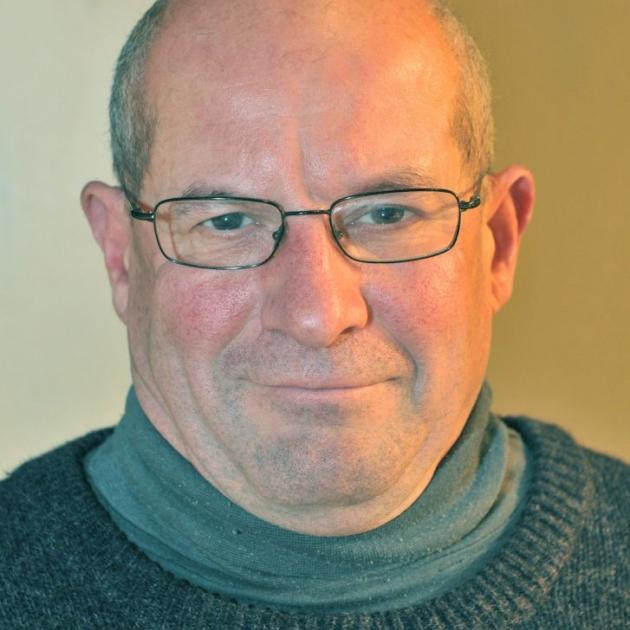
''Bennett brings these issues to the fore but I don't think he answers any questions about them. He doesn't excuse any of this stuff but what he does is present it and it's up to the audience to decide in their own minds how they will take this information on board,'' he said.
''I don't think that's the point of the play and it tends to get blown out of proportion simply because it's a topic that's discussed a lot today. The real things are going back to education.''
The headmaster believes what matters is that the school, which is underperforming, goes up in the league tables by getting the boys into Oxford or Cambridge.
He's not interested in the boys' welfare or anything except the results for him and the school.
Dorothy Lintott, the history teacher, thinks teaching is about facts properly presented.
She's a no-nonsense teacher and a frustrated feminist in a male world.
''She's a wonderful character and as the token female voice in an all-boys school, she feels as if she gets drowned out. When she does get the opportunity she lets fly with what her feelings are.''
Hector, the older teacher, is the humanitarian who believes in knowledge and education for its own sake.
He doesn't want to teach people to be doctors or lawyers or even teachers, but he believes knowledge, literature, art and poetry provide an antidote and insulation against the hard knocks of life, Scott said.
''One of the boys says: `I don't understand poetry because all that stuff hasn't happened to us yet', and Hector says: `But it will, Timms, it will. And when these bad things do happen in your life, you will have the antidote ready'.''
The fourth teacher, Irwin, is straight from university and ''only five minutes older'' than the boys.
He has been hired to bring the boys up to scratch for their Oxbridge exams and he has a new approach.
He doesn't care what you say or what you learn as long as in the examination you say things cleverly, Scott says.
''You don't have to know anything but you have to pretend to know something. It's all about finding new angles, about entertainment in a way, which Lintott dismisses as journalistic teaching.''
When Irwin suggests making Stalin look good, one of the boys says: ''But that's not true'', and Irwin says: ''What's truth got to do with history? What matters is that you are writing a paper that is entertaining and different from the other 1500 papers the examiner is going to read.''
Scott thinks there's a strong element of this in modern education, particularly tertiary education.
Nevertheless the characters and action in the play are so extreme it could never actually happen, he says.
''Bennett takes it from the probable to the highly improbable. All the characters are extended. He takes an eccentric teacher like Hector and makes him doubly eccentric. The boys are far too clever; they are far too witty; they are far too together. The headmaster is this caricature of a frustrated leader and Lintott is an extreme of a feminist caught in a male environment. In a real classroom none of this would have happened. Because Bennett stretches all this out, the play becomes exactly what it should be, a night at the theatre.''
The director aims to make his production fresh, rather than imitate what has been seen in the film and other productions, and make it clear this is theatre, not a reflection of reality, he says.
See it
The History Boys, by Alan Bennett, opens at the Globe Theatre in London St, Dunedin, on May 29 and runs until June 7.
Directed by Keith Scott, it features Craig Storey, Andrew Brinslie-Pirie, Denise Casey, Warren Chambers and James Tregonning as teachers, and Jo Secher, Elliot Phillips, Oscar Macdonald, Nick Tipa, Reuben Hilder and Zac Nicholls as the boys.







